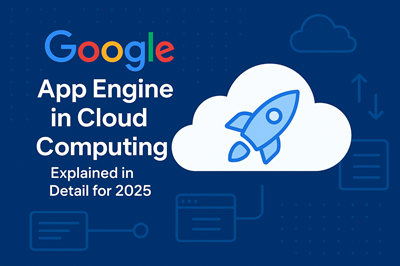Google App Engine in Cloud Computing: Explained in Detail for 2025
Google App Engine (GAE) is a foundational Platform as a Service (PaaS) within Google Cloud’s comprehensive cloud computing portfolio. Its mission is to enable developers and businesses to build, deploy, and scale applications quickly with no infrastructure management. As cloud computing usage surges in 2025, understanding Google App Engine’s architecture, offers, and integrated services is pivotal for leveraging Google Cloud’s ecosystem efficiently.
This detailed article explores the structure and benefits of Google App Engine, outlines the extensive services offered, addresses misconceptions such as “google’s app engine platform is iaas offering,” and highlights its synergy with Google APIs and free database options. Additionally, it clarifies the significance of the name “Google Cloud” and Google App Engine’s positioning within cloud computing.
What is Google App Engine?
Google App Engine is a fully managed serverless platform allowing developers to run applications without worrying about server management, configuration, or scalability. GAE supports multiple programming languages including Python, Java, Node.js, Go, and more, simplifying development cycles.
Architecture of Google App Engine
GAE relies on the following architecture aspects:
-
Stateless Instances: Application code runs in containerized, stateless instances that scale automatically based on traffic.
-
Load Balancing & Traffic Splitting: Flexible routing of requests across multiple app versions.
-
Managed Runtime Environments: Several language runtimes maintained, patched, and updated by Google.
-
Integration With Managed Databases: Seamless interaction with Firestore, Cloud SQL, Cloud Storage.
-
Background Processing: Task Queues and Cron Jobs running asynchronously.
-
Monitoring & Security: Embedded monitoring and Google-grade security fabric.
Services Offered by Google App Engine
-
Multiple Runtime Environments: Managed environments for popular programming languages.
-
Custom Runtime Support: Flexible Environment permitting custom Docker containers.
-
Automatic and Manual Scaling: Autoscale with advanced configuration.
-
Version Management: Deploy new app versions with simple traffic control options.
-
Cloud Databases & Storage: Integrated access to Firestore, Cloud SQL, Bigtable, and Cloud Storage.
-
Developer Tools: Integrated with Cloud Build, Cloud Logging, and Cloud Monitoring.
-
Security: IAM, SSL certificates, and firewall rules.
Google App Engine Offers
GAE’s offers in 2025 include a generous free tier allowing 28 instance hours per day, 1GB outbound traffic, 5GB storage, and limited free Cloud Datastore/Firestore usage. New customers receive $300 free Google Cloud credits, enabling broader experimentation with paid services.
Common Misconception: Is Google’s App Engine Platform IaaS?
Google App Engine is a PaaS, not an IaaS offering. It abstracts infrastructure to focus on application code, whereas Google Compute Engine provides IaaS by managing VMs and infrastructure components directly.
Google API and Free Database Ecosystem
Google App Engine integrates seamlessly with Google APIs like Maps, Gemini AI, Vision API, and offers free-tier databases such as Firestore and Cloud SQL to build rich, scalable applications while minimizing costs.
The Name of Google Cloud and Its Significance
“Google Cloud” represents an all-encompassing, unified cloud service ecosystem that integrates compute, storage, AI, networking, and developer tools, with Google App Engine as a leading PaaS facilitating cloud-native application deployment.
Benefits of Google App Engine in Cloud Computing
-
Accelerated development with managed infrastructure.
-
Scalable, cost-effective operations.
-
Secure and compliant with industry standards.
-
Rich ecosystem integration empowering intelligent apps.
-
Flexible development across languages and frameworks.
Use Cases
Typical use cases in 2025 include web and mobile backends, IoT data processing, real-time collaboration, AI-driven apps, and large-scale content hosting.
Conclusion
Google App Engine stands as a vital PaaS solution in cloud computing, renowned for its developer-friendly approach, robust service suite, and scalable architecture. Leveraging GAE with Google Cloud’s APIs and free database options enables businesses to build modern, reliable, and performant cloud applications efficiently.
